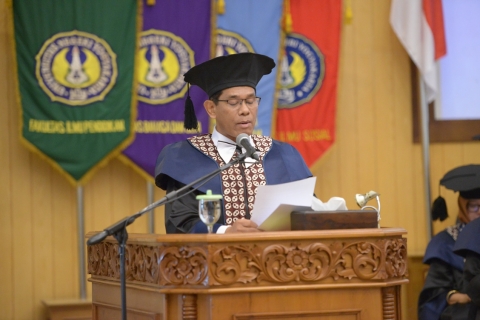Machinery process is a process that is used to remove some dimensions from the workpiece by using machine tools and cutting tools (metal cutting process) to form components as desired. The machinery process up to now is the most widely used process in making a complete machine component and is a manufacturing process that has a central role in making a unit of equipment or machinery. The aim of machinery learning is emphasized on achieving competence in two ways: the work process and work results (products). The work process includes: work steps, use of machinery and tools, use of measuring instruments, maintenance of machines and assistive devices, time allocation used, work attitude, and work safety. While the results of work in the form of products, emphasized the quality of dimensions, geometry quality, and surface quality of the workpiece or the level of roughness. In order to run the learning of the machinery process properly, students must have supporting abilities in the fields of technical drawing, material science, industrial metrology and machining theory. As stated by Prof. Dr. Ir. Dwi Rahdiyanta, M.Pd. in his inaugural speech as Professor in the Field of Machinery Learning Process at the Faculty of Engineering, Yogyakarta State University. The speech entitled "The Challenges of Machinery Learning in the Industrial Revolution Era 4.0" was read in an open Senate meeting in the Main Meeting Room of the Rector of UNY, Saturday (15/2). Dwi Rahdiyanta is the 151st professor of UNY.
The man born in Gunungkidul, 15 February 1962 said, the challenge in learning modern machine is the problem of the availability of CNC (Computer Numerical Controlled) and CAD / CAM (Computer Aided Design and Computer Aided Manufacturing) machine facilities in the world of education. CNC and CAD / CAM machine facilities on campus / school are still considered to be very lacking and still lagging behind those in the industry. This results in a link and match trouble between educational institutions and industrial world. "To overcome these challenges and at the same time to improve student work readiness in the machining field, it is necessary to develop a learning model that involves directly the industrial world or the world of work" said Dwi Rahdiyanta. Cooperation with the industrial world is very important to do because of two considerations: the high price of CNC and CAD / CAM machines and the industry has more advanced technology.
The Doctor of Science in Technology and Vocational Education of UNY explained, one of the learning models suitable for teaching is a teaching industry learning model that is a productive vehicle based on research and innovation to support the learning process in synergy with industry and government. The tertiary institution utilizes the teaching industry as a vehicle for downstreaming / manufacturing its research products and training students to conduct real practice through industrial work practices or work based learning. Industry can utilize teaching industry to produce goods or spare parts needed for completeness of its products. In the teaching industry, learning resources available on campus can be used to improve the skills and competencies of human resources in the context of creating added value and increasing productivity. From the teaching industry teaching model in this machining field, it is expected that there will be a turnaround of research results and innovations from universities which are expected to enter the market segment as a substitute for imported products, so that Indonesia's dependence on imported products, especially in the field of machine components can be reduced step by step.
Warga Warungboto Umbulharjo Yogyakarta tersebut mengemukakan, di era Revolusi Industri 4.0, guru/dosen menghadapi tantangan dalam proses pembelajaran. Tantangan tersebut berasal dari perkembangan teknologi digital di bidang informasi dan komunikasi yang memberi dampak pada teknologi pembelajaran dan perubahan karakter peserta didik dalam belajar. Tantangan real yang dihadapi para guru adalah bahwa para siswa telah mengenal teknologi informasi dan komunikasi (TIK) dalam usia yang lebih dini dari pada gurunya. Untuk mengatasi masalah tersebut para guru/dosen dituntut dapat melaksanakan pembelajaran menggunakan multi user virtual environments (MUVEs). Agar dapat melaksanakan pembelajaran menggunakan MUVEs dengan baik, para guru/dosen harus menguasai kemampuan yang terkait dengan: (1) Data Literacy, yaitu kemampuan untuk membaca, menganalisis, dan menggunakan Big Data (informasi) di dunia digital; (2) Technological Literacy, yaitu meliputi: coding, artificial intelligence, dan engineering principles (memahami cara kerja mesin, dan aplikasi teknologi); dan (3) Human Literacy (humanities, communication, dan design). (Dedy)
The resident of Warungboto Umbulharjo Yogyakarta said that in the Industrial Revolution 4.0 era, teachers / lecturers faced challenges in the learning process. The challenge comes from the development of digital technology in the field of information and communication that has an impact on learning technology and changes in the character of students in learning. The real challenge faced by teachers is that students become acquainted with information and communication technology (ICT) at an earlier age than their teachers. To overcome this problem teachers / lecturers are required to carry out learning using multi user virtual environments (MUVEs). In order to be able to carry out learning using MUVEs well, teachers / lecturers must master the skills related to: (1) Data Literacy: the ability to read, analyze, and use Big Data (information) in the digital world; (2) Technological Literacy, which includes: coding, artificial intelligence, and engineering principles (understanding how the machine works, and the application of technology); and (3) Human Literacy (humanities, communication, and design). (winarti)

